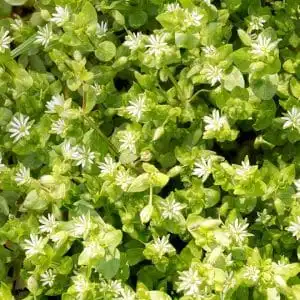One of the most common weeds found in lawns, chickweed (Stellaria media) originated in Europe, but now makes itself at home throughout North America and across the globe. Consumed by some as a flavorful green, this edible annual has a history as an herbal remedy for a variety of symptoms. But don’t let this pretty little plant fool you with its medicinal, aesthetic, and nutritional value—it’s definitely a weed. Its competitive nature threatens the well being of your landscaping as it vies with the grass and plants in your yard for space, light, and water.
Identifying Chickweed
Also known as chickenwort, winterweed, and starweed, chickweed gets its name naturally by being a preferred treat for chickens and other birds, and also by being a stubborn weed that’s hard to get rid of once it’s established.
Identify this plant easily by its small, white, star-shaped flowers that bloom from June through September. Although each flower has five petals, it appears to have double that amount because each petal is divided. Forming a thick mat, stems branch abundantly at the base, but seldom grow higher than two inches. Common chickweed differs from other plants in its family in that a thin line of white hair grows only on one side of the stem, while other relatives have stems completely covered in hair. Its oval-shaped, green leaves are tapered at the tip and grow opposite of each other.
Chickweed Signs and Symptoms
A prolific seed producer, common chickweed can also reproduce by creeping stems that root from nodes. This widespread weed grows easily in a variety of environments, but enjoys well-watered areas. It germinates most abundantly after heavy watering or rainfall. Plants can produce thousands of seeds in pods at the tip of each stem. With shallow, fibrous roots, this pesky plant is easily uprooted, yet recovers quickly.
Chickweed Control and Prevention
Chickweed is difficult to eradicate because of the way it sets seed. Hand weeding is effective in small amounts, but must be done before the plants flower. This is often difficult because of chickweed’s short germination period. If you choose this route, be sure to remove the entire root system from the ground and dispose of it away from the property. Another natural way to prevent this weed, and many others, is by using mulch. This helps minimize germination by blocking light and creating a barrier.
It’s best to consider non-chemical methods first when controlling chickweed, but bigger infestations often require the use of an herbicide treatment. Use pre-emergent herbicides before seeds germinate in late fall or early winter, and post-emergent herbicides after the weeds have appeared. Be sure to follow directions on the label carefully. Timing is everything when applying any chemical, so it’s best to contact a professional.
To find out more about identifying and controlling common chickweed or other weeds, call Free Spray Lawn Care at 419-529-5296.



Comments (0)
Thanks for your comment!
Thanks for your feedback! Your comments have been successfully submitted! Please note, all comments require admin approval prior to display.
Error submitting comment!
There is a problem with your comment, please see below and try again.